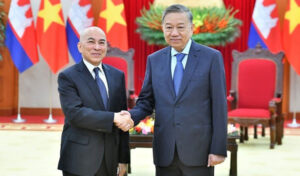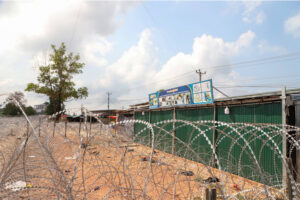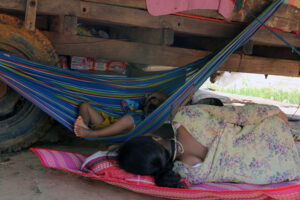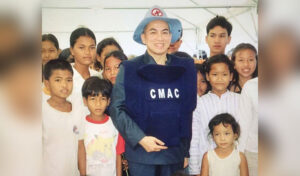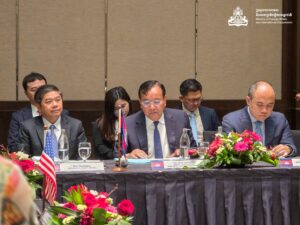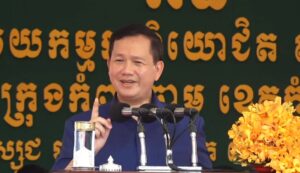Selected Comments Samdech Techo Hun Sen, President of the Senate, at the ceremonial dinner with the Association of Nak Oknha/Oknha [Unofficial translations]
![Selected Comments Samdech Techo Hun Sen, President of the Senate, at the ceremonial dinner with the Association of Nak Oknha/Oknha [Unofficial translations]](https://grandnewsasia.com/app/uploads/2024/04/photo_2024-04-26_19-37-49.jpg) Selected Comments Samdech Techo Hun Sen, President of the Senate, at the ceremonial dinner with the Association of Nak Oknha/Oknha [Unofficial translations]
Selected Comments Samdech Techo Hun Sen, President of the Senate, at the ceremonial dinner with the Association of Nak Oknha/Oknha [Unofficial translations]
(1) The position of Honorary President of the Association reflects a belief in the ability and leadership
I am pleased to have been invited to be the Honorary President (of the Nak Oknha and Oknha Association – NOA) […] clearly, all of you have honored me with confidence in my abilities and leadership and that we have lived together for over 45 years. I always consider the private sector to be the locomotive of economic growth, while the Royal Government is just the economists who provide strategic leadership. The role of driving the economy, economic growth, rests on those who have capital, and most of them have become Nak Oknha and Oknha. I should take on the role that you have all entrusted with me for so many years, to gather with and to keep you all calm and confident, and to mobilize you all to trust in and continue to make investments in your homeland […]
(2) Nak Oknha/Oknha play two roles in the pentagonal strategy – economic and employment growth
There are two important things that all of you have been doing – economy and employment growths. Speaking of rectangular and pentagonal strategies, they include growth, employment, equity, efficiency, and now sustainability. But in these five pentagons, you play two important roles – firstly, you drive economic growth through your role. A large part of the growing economy is driven by those who have capital to invest; and secondly, what you are investing in is helping to solve the hundreds of thousands of jobs that are done directly by companies, factories, enterprises, farms, agriculture and other sectors […] I continue to have a role in leadership except that I am not holding the executive power as before. I do not issue order as a Prime Minister […] as one of the longest-serving prime ministers in the world, I know exactly the working manner of the Prime Minister […]
(3) Wealthy people participate in building achievements to serve society
In connection with the efforts that you are working to promote economic growth and job creation, we have noticed that they have provided opportunities for Cambodia to grow. There is another work that you have played active role in – the art of sharing […] almost half of the schools in Cambodia are built by Cambodian philanthropists. This is a special feature of the wealthy or the current Nak Oknhas/Oknhas who have contributed a lot to the education sector, which is training millions of people […] and there have more been achievements such as roads, hospitals, wells, ponds, pagodas, etc. The Nak Oknhas/Oknhas have made many contributions to the Royal Government, all of which have served our people. Apart from that, when there are force majeures such floods, droughts, especially the Covid-19 disease, Nak Oknhas/Oknhas always come out to help the Royal Government directly, or through HM the King, the Red Cross […]
(4) Cambodian people’s understanding and support – a national movement to realize the Funan-Techo canal
[…] The Funan-Techo Canal […] is the decision of the Council of Ministers led by Hun Sen. Now, Hun Sen is defending this thesis and explaining it to his friends in the region and the world, especially to the Cambodian people, about the importance of the Funan-Techo canal. A few days ago, I posted my reaction on Facebook to those who suggested that the Funan-Techo canal would allow China navy to use it. Now I have to make a clear (argument). I do not allow anyone to burn my house just to cook a piece of his/her meat. Whether s/he is a friend or an enemy. No matter who that country is, I must defend my country. They have to recognize Cambodia’s interests. More importantly, I need the Cambodian people’s understanding and support to become a national movement to realize the Funan-Techo canal […]
(5) Four benefits of the Funan Techo canal
What is the role of the Funan-Techo canal? What are the benefits? […] how will we benefit from this canal? Firstly, it provides convenient transportation within the country and directly connected to the sea without crossing other countries. It will boost the economy not only in the southwest but across the country. Our agricultural products from Kratie, Stung Treng, Kampong Cham […] Siem Reap and Kampong Chhnang, etc., will be able to travel through this canal to the sea […] It will reduce the cost of transportation, which makes Cambodia profitable […] and hopefully the Vietnamese leaders will understand what the needs I am talking about […]
A second benefit of southwestern Cambodia would be to have an irrigation system to remedy the shortage of water. As in present, we have had no rain for 6 or 7 months in a row […] Takeo lacks even clean water for use. Once we have this canal ready, it will be the source of water supply to the southwest of Cambodia, which includes part of Kandal province to Takeo, Kampot and Kep. It can also extend to Kampong Speu and our rice fields in the southwest will be transformed from one-time rice cultivation to twice or three times rice cultivation […]
The third benefit is to be able to relieve flooding, especially when there is floodwater on the southwest front […] once we have this canal, the rainy season, when there will be abundance of water, the canal will channel the pressure to the sea, reducing the flooding in our southwest, and a part, reducing the flow of water towards Vietnam […]
The fourth benefit of aquaculture is related to the growth of fish population in the canal, and in addition, people may operate fish and shrimp farming too […]
(6) If fresh water flows off into sea, Cambodia itself is the first victim
Vietnamese scientists have repeated and the Vietnam Express recently reported that should Cambodia dig this canal, there will be loss of 70% of the water that will go down to Vietnam. Let me ask, where would the water go? Please write it down and show it to the Vietnamese leader. We are the ones thar have to protect ourselves. Vietnam does not have to worry. If we allow fresh water to flow off to the sea, before it happens to Vietnam, Cambodia itself will be the victim […] The Vietnamese leader may say why Hun Sen does not talk with the (Vietnamese) leaders? Why talk openly? It is because the Vietnamese leadership failed to tell the people below not to talk, and to let the upper echelons talk […] let me remind that we have up to three sluice gates that ensure that fresh water does not go out to sea and that salt water from the sea does not enter the canal […]
(7) Not for Chinese navy because Cambodia does not need it, Vietnam and Cambodia have good friendship relations, Vietnam and China have good relations
We know that Vietnam State Institute, which (claims) that the canal would facilitate use by the Chinese navy. Therefore, let me reply by asking what does Cambodia need Chinese troops for? This is the first point. Secondly, Vietnam and Cambodia have good and friendly relations in all fields. Thirdly, Vietnam and China have good relations […] why should Cambodia be stupid to host the Chinese troops on its territory, the act of which is contrary to its own Constitution. The Article 55 – any agreements that are contrary to the sovereignty and neutrality of Cambodia shall be automatically repealed. China is not foolish to deploy troops in Cambodia either, because it is contrary to the principles of respect for Cambodia’s independence and sovereignty. Please do not be too extreme to insult Cambodia […] In 2016, there was an incident that Cambodia also lacked water […] at that time, the level of water in the rivers was low, causing the sea water flowing into the lower half of Vietnam. That was a natural disaster, it was not causing by Cambodia […]
(8) Abandon the Stung Treng and Kratie hydropower projects to alleviate the concerns of the people and Vietnam
Earlier, Laos’ Xayaburi hydropower plant was also opposed […] I encouraged the construction going. We volunteered to abandon the Stung Treng hydropower project and the project in Kratie at Sambo, which has been studied from previous generations […] in order to alleviate the people’s worries as well as Vietnam’s concerns. As far as the Funan Techo Canal is concerned, there has no impacts whatsoever to ecology. On the contrary, it creates an ecological system that connects the Bassac River to the sea transforming from a waterless condition to a watery state. I do not urge the Cambodian people to hate the Vietnamese people, but I also urge the Vietnamese people to do the same, and consider each other’s interests […]
(9) Funan Techo canal sits neither on the body nor the early tributary, but the late tributary of the Mekong River
Despite the change of ministers (in Cambodia), we still have the study data in hands. There has been this case that at the beginning of the flood season in July and August, flooding in the Cambodian provinces of Kandal, Prey Veng, Svay Rieng, Takeo, Kampot, which borders on with Vietnam, did not seem to flow off. The reason is because Vietnam closed the dams (that they built in their country to prevent flood from coming before they reap their agricultural harvest), and that left the flood in the Cambodian side […] I never talked about that. I am forced to say now so that “you should not think only of your interests, and while I have not even done anything yet, you attack me, connecting me to the navy, to this or that” […] The 1995 Mekong Agreement requires the signatories informing the Mekong River Commission prior to the start of the project […] but do not require the signatory parties to seek consultation or approval from other signatory countries if we use the Mekong tributaries […] (and in this case,) we do not use the Mekong River. We are going to use even the late tributary of the Mekong River […] Cambodia has informed this to the Mekong River Commission since August last year […] one may ask if the Mekong River Agreement is still valid or not? If it is still valid, do not worry about negotiating/consulting anyone […]
(10) President of the ruling party entitled to represent the people and express opinion in defense of the national interest
I hope that the Vietnamese leaders will accept the fact that […] I have the need to respond openly in the voice of Hun Sen, the representative of the whole Cambodian nation. Even though I am not the Prime Minister, as the President of the ruling party that oversees political power, I have the right to be the representative of the Khmer nation. Even though it is not the executive branch, representing the Khmer nation, I have the right to express opinion in defense of national interests […] I have had to speak and send a message to the Vietnamese people to recognize Cambodia’s interests, and send a message to the Cambodian people to accept the consideration of their national interests, and oppose all the actions of the traitors who are destroying their nation […] without the canal, Cambodia would continue to rely on breathing through others’ […] it is a message to Vietnam arguing why Cambodia decided to go ahead with the project […] once the canal is in operation, with the lower costs of transportation, electricity, we would be able to compete […]./.

